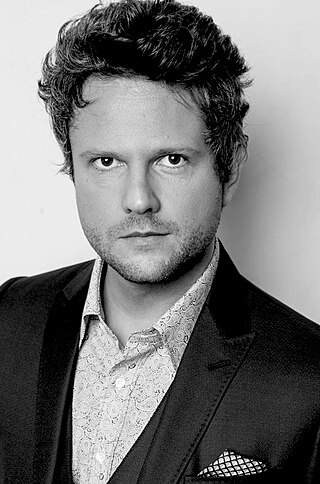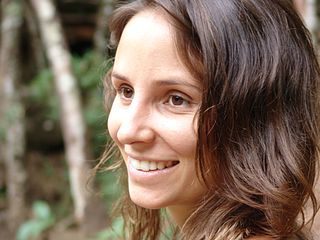Related Research Articles

Maria do Carmo Miranda da Cunha, known professionally as Carmen Miranda, was a Portuguese-born Brazilian singer, dancer and actress. Nicknamed "The Brazilian Bombshell", she was known for her signature fruit hat outfit that she wore in her American films. As a young woman, she designed hats in a boutique before making her first recordings with composer Josué de Barros in 1929. Miranda's 1930 recording of "Taí ", written by Joubert de Carvalho, catapulted her to stardom in Brazil as the foremost interpreter of samba.

Sônia Maria Campos Braga is a Brazilian actress. She is known in the English-speaking world for her Golden Globe Award–nominated performances in Kiss of the Spider Woman (1985) and Moon over Parador (1988). She also received a BAFTA Award nomination in 1981 for Dona Flor and Her Two Husbands. For the 1994 television film The Burning Season, she was nominated for an Emmy Award and a third Golden Globe Award. Her other television and film credits include The Cosby Show (1986), Sex and the City (2001), American Family (2002), Alias (2005), Aquarius (2016), Bacurau (2019), and Fatima (2020). In 2020, The New York Times ranked her #24 in its list of the 25 Greatest Actors of the 21st Century.

Selton Figueiredo Mello is a Brazilian actor and director. Since his childhood, he acted on TV shows. Now he works on TV, movies and theater. Throughout his career, he developed a strong and solid experience in cinema, producing and directing movies and videoclips, and being publicly and critically acclaimed for it. The actor hosted Tarja Preta, a TV show about culture and independent movies, from 2004 until 2008.
Kátia Lund is a Brazilian film director and screenwriter. Her most notable work was as co-director of the film City of God.

Down Argentine Way is a 1940 American musical film made in Technicolor by Twentieth Century Fox. It made a star of Betty Grable in her first leading role for the studio although she had already appeared in 31 films, and it introduced American audiences to Carmen Miranda. It also starred Don Ameche, The Nicholas Brothers, Charlotte Greenwood, and J. Carrol Naish.

Marília Soares Pêra was a Brazilian actress, singer, and stage director. Hailed as "one of the decade's [1980s] ten best actresses" by Pauline Kael, Pêra won the National Society of Film Critics Award for Best Actress in 1982 for her role in Hector Babenco's acclaimed Pixote, and received Best Actress awards at the Gramado Film Festival and at the Cartagena Film Festival for Carlos Diegues' Better Days Ahead. Other films include Bar Esperança, Angels of the Night, and Diegues' Tieta do Agreste.

Marieta Severo da Costa is a Brazilian stage, film and television actress. She is best known to youth audiences as the archetypal mother figure in popular sitcom A Grande Família (2001–2014), as well to mature audiences for portraying villains in telenovelas.

Adriana Lisboa is a Brazilian writer. She is the author of seven novels, and has also published poetry, short stories, essays, and books for children. Originally written in Portuguese, her books have been translated into more than a dozen languages. Crow Blue is Lisboa's most recent novel translated into English and was named a book of the year by The Independent (London). Her stories and poems have appeared in Granta, Modern Poetry in Translation, The Brooklyn Rail, Litro, The Missing Slate, Joyland, Sonofabook, Waxwing, and others.
Ludmila Dayer-Middleton is a Brazilian-American actress, director and producer.
Vida de Menina is a 2004 Brazilian drama film. It was the first feature-length fiction film directed by Helena Solberg. The film is an adaptation of Minha Vida de Menina, the diary of Helena Morley.

Carmen Miranda: Bananas is My Business is a 1995 documentary filmed and directed by Helena Solberg. This documentary chronicles the life and career of Carmen Miranda, Hollywood's symbol of Latin American spirit in the 1940s. The documentary tells her life story in a series of stages, beginning with her roots and rise to stardom in her home country of Brazil, her transition and development as a performer in the United States, first on Broadway in New York City, then in the film industry after she signed with 20th Century Fox in Los Angeles, and her later years in life, before her death and her return to Brazil. Helena Solberg uses two different film styles, biography and directorial reverie, in which Solberg uses actor Erick Barretos to “resurrect Carmen Miranda in several fantasy sequences. Helena Solberg's attitudes shift throughout the documentary from awe-struck child to empathetic and forgiving Brazilian woman, which she uses to represent the contradictory subplots of Carmen Miranda's life. Alongside the fantasy like resurrection of Miranda, Solberg accompanies her documentary with multiple interviews with Carmen Miranda's friends and family, like her sister, her first boyfriend, the guitarist Laurindo Almeida, samba song-writer Synval Silva, Cesar Romero, and Alice Faye.

Petra Costa is a Brazilian filmmaker and actress. She has been a member of the Academy of Motion Picture Arts and Sciences since 2018.

Carmen Miranda Museum, located in the Parque Brigadeiro Eduardo Gomes, is a museum established in homage to singer and actress Carmen Miranda and open to the public since 1976. The museum was officially opened on the 21st anniversary of her death.
Maria Ceiça is a Brazilian actress, singer and performer, who has a significant career in theater, movies and television.

Banana da Terra is a 1939 Brazilian musical film directed by Ruy Costa and written by Braguinha and Mário Lago. The film stars Carmen Miranda, Dircinha Batista and Aloysio de Oliveira. It was Miranda's last film in Brazil, before she moved to Hollywood.

Carmen - Uma Biografia is a 2005 biographical book written by Ruy Castro. Published in 2005 by Companhia das Letras, the book treats on the main events Carmen Miranda's life, from his rise as a radio singer in the 1930s in Brazil, through the acme period of his career as a Hollywood actress and singer of Broadway to the process of decline and death.
Ana Maria Bahiana is a Brazilian-born Los Angeles-based American author, journalist and lecturer known for her work in cultural journalism. She has worked in a variety of media: newspapers, magazines, television, radio and the Internet.
The It's All True – International Documentary Film Festival, also known as É Tudo Verdade, is an international film festival held annually in Sao Paulo and Rio de Janeiro, Brazil.

Vladimir Seixas is a Brazilian filmmaker and International Emmy nominee for best documentary. Vladimir has been working since 2008 on documentary direction and script. His films investigate the social, political and cultural transformations in Brazil in recent years from the social and collective urban movements and also from the behavior of the crowds. His debut short "Hiato" (Hiatus) was selected for several film festivals in the world, where he received 12 awards. He directed the film "A Primeira Pedra" (The First Stone – The Rise of Lynching in Brazil), winner of TAL - Latin America TV on DocMontevideo for best documentary, winner of the bronze medal in the Human Rights category of the New York Festivals - TV & Film and was nominated for an 47th International Emmy Awards in 2019. Vladimir Seixas directed five short films, two feature films, a series and a telefilm, participating in more than 50 film and TV festivals around the world where he received several awards.
References
- ↑ Burton, Julianne (28 June 2010). "Helena Solberg-Ladd (Brazil and United States)". ISBN 9780292791633 . Retrieved July 8, 2014.
- ↑ Rubin, Nani (April 5, 2014). "Helena Solberg, a única mulher do cinema novo, ganha retrospectiva". O Globo . Retrieved July 8, 2014.
- ↑ "CBS wins 17 Emmys in news competition". October 18, 1983. p. The Day. Retrieved July 8, 2014.
- ↑ "AS VERDADES DE HELENA E GLÓRIA". Jornal do Brasil . June 22, 1967. Retrieved May 20, 2015.
- ↑ "CINEASTRA - Helena Solberg". cinelatinoamericano.org/. Retrieved July 8, 2014.
- ↑ ""Vida de Menina" é eleito melhor filme em Gramado". Terra Networks . August 21, 2004.
- 1 2 UA Center for Latin America Studies (2018-09-17), Helena Solberg Interview las 460/560 , retrieved 2018-11-01
- 1 2 Foster, David William (July 2012). "This Woman Which is One: Helena Solberg-Ladd'sThe Double Day". Journal of Iberian and Latin American Research. 18 (1): 55–64. doi:10.1080/13260219.2012.691261. ISSN 1326-0219. S2CID 143651472.
- ↑ Solberg-Ladd, Helena. “The View from the United States.” pp. 81–102.